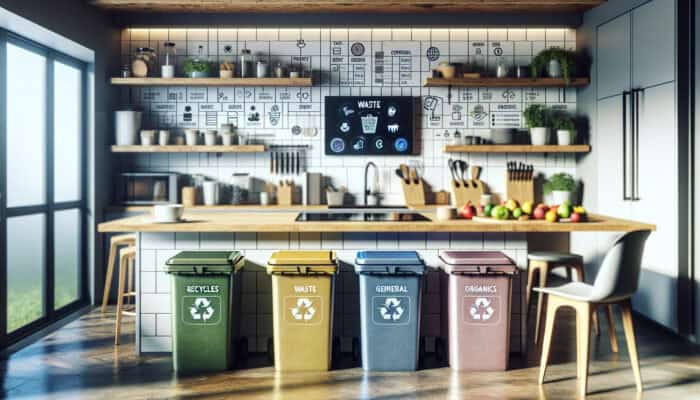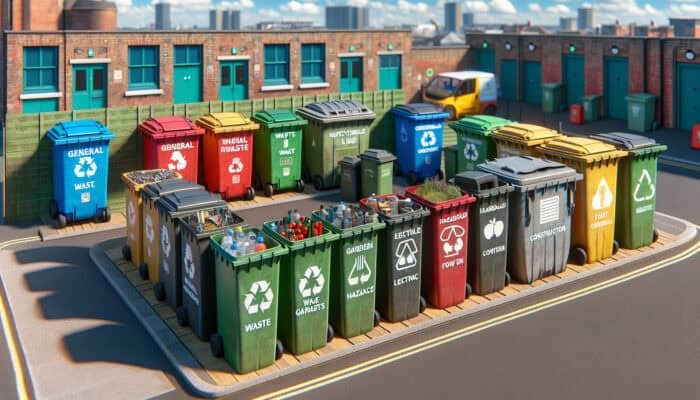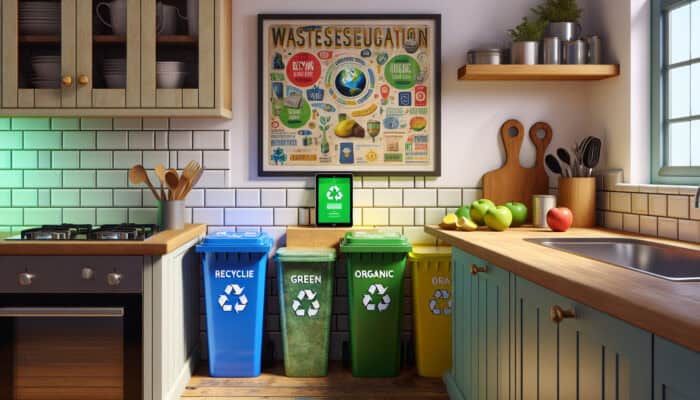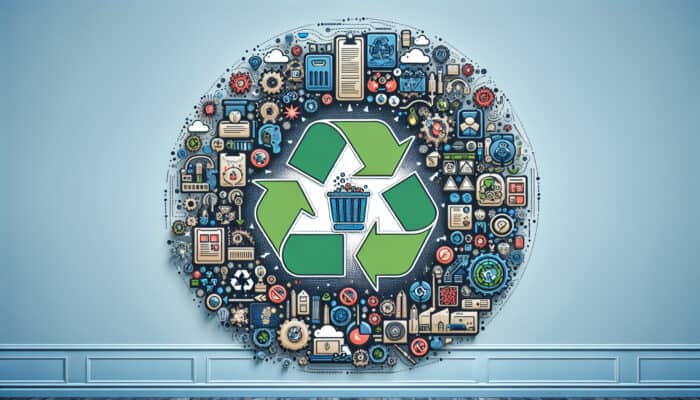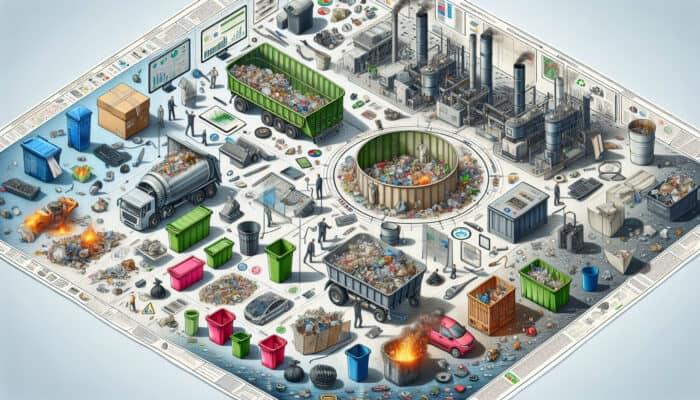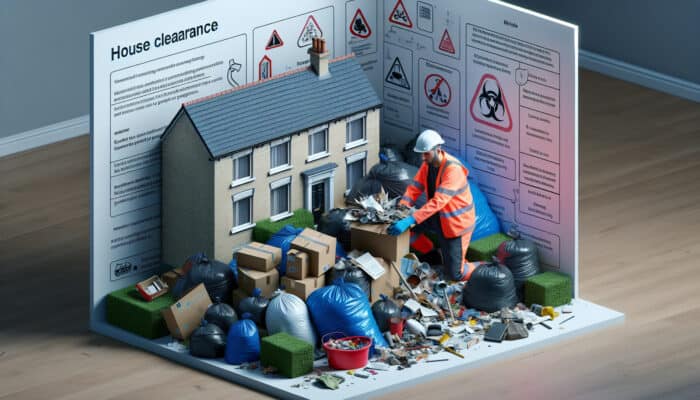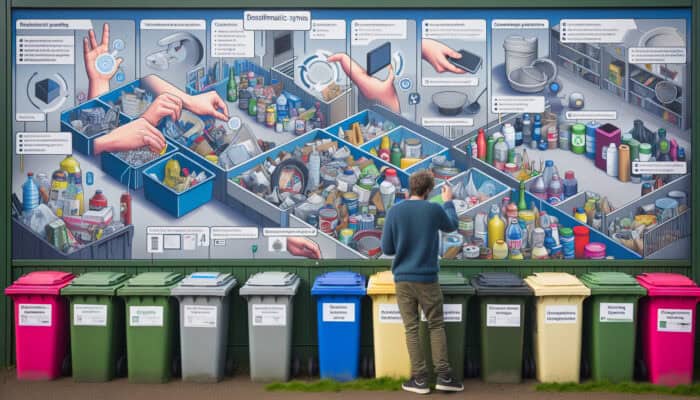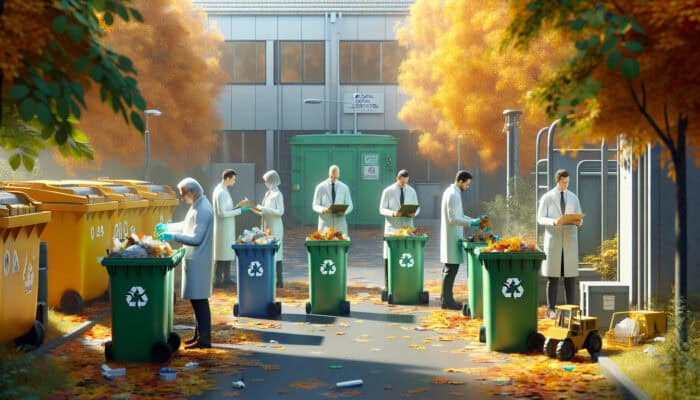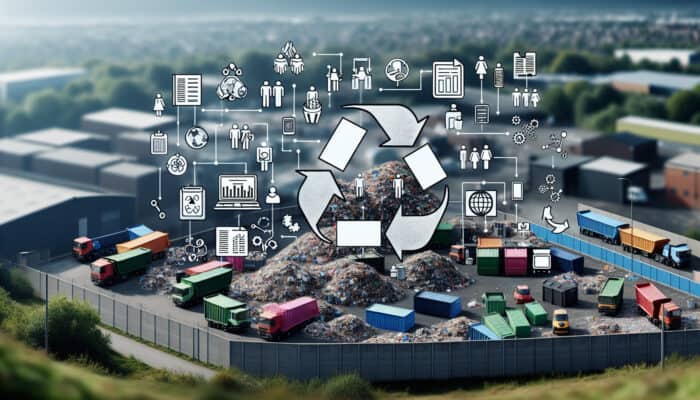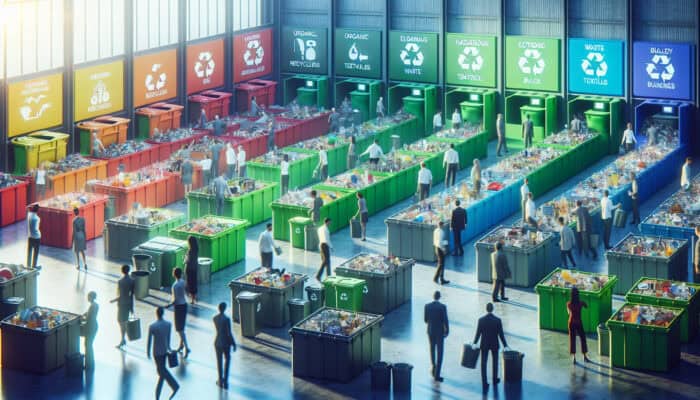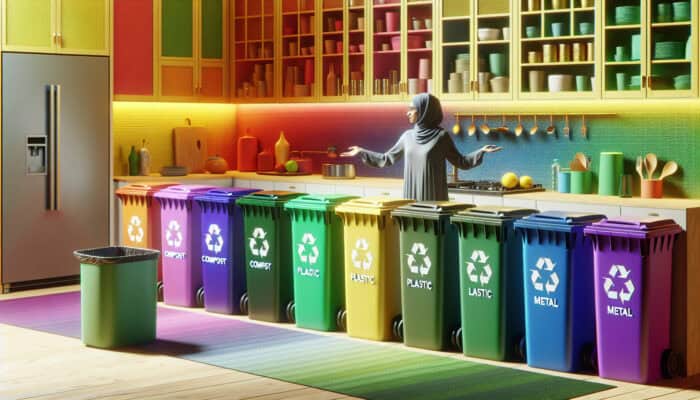Essential Insights into Hazardous Waste Regulations for Effective Management
What Defines Hazardous Waste and Its Risks?

Hazardous waste encompasses materials that can pose significant risks to public health and the environment when not managed appropriately. This category includes harmful substances like chemicals, batteries, and asbestos. The effective classification and management of hazardous waste are imperative, as neglecting these responsibilities can result in severe health hazards and environmental degradation. Common hazardous wastes found in households include:
- paints and solvents
- Batteries
- Pesticides and herbicides
- Cleaning products
- Asbestos and materials containing asbestos
- Fluorescent light bulbs
- Electronic waste, such as outdated computers and televisions
- Used motor oil
Recognizing these hazardous materials during house clearance is essential for compliance with regulations and for protecting both public health and the environment.
How is Hazardous Waste Legally Regulated in the UK?
The legal framework in the UK is meticulously structured to effectively govern the management and regulation of hazardous waste from its inception to its final disposal. Central to this framework are the Hazardous Waste Regulations 2005, which outline comprehensive procedures for the handling, transportation, and disposal of hazardous waste. This legislation aligns with the European Waste Framework Directive, ensuring that the UK adheres to international waste management standards. Compliance is not optional; failure to comply can result in significant financial penalties and legal repercussions.
In addition to the Hazardous Waste Regulations, other essential legislation, such as the Environmental Protection Act 1990 and the Waste (England and Wales) Regulations 2011, delineates the obligations of waste producers and disposers. These laws offer detailed guidelines for the classification, labeling, and safe management of hazardous materials, ensuring that both businesses and homeowners operate within a safe, regulated framework.
What Are the Key Responsibilities of Homeowners in Handling Hazardous Waste?
Homeowners play a crucial role in identifying and managing hazardous waste during house clearance. It is important to recognize that simply throwing these materials in standard waste bins is illegal and can lead to serious consequences, including prosecution. Homeowners must educate themselves about what constitutes hazardous waste and follow the correct disposal protocols.
A primary responsibility involves accurately identifying hazardous materials. Homeowners should conduct a thorough inspection of their properties, particularly in less frequented spaces such as garages, basements, and sheds, where hazardous waste often accumulates. Once identified, it is vital to separate these materials from regular waste and consult local authorities or licensed disposal services for appropriate disposal methods. Ignoring this responsibility not only jeopardizes public health but also risks environmental safety, as hazardous waste can contaminate soil and water sources, leading to long-term damage.
How Can You Effectively Classify Various Types of Hazardous Waste?
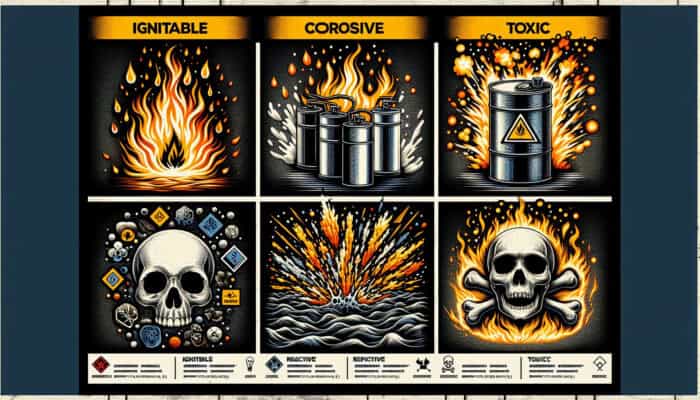
Hazardous wastes are categorized based on specific characteristics, including ignitability, corrosivity, reactivity, and toxicity. Understanding these classifications is imperative for safe handling and disposal. For example, ignitable wastes, such as certain solvents and oils, are highly flammable. In contrast, corrosive wastes can cause serious damage to materials they come in contact with, posing significant health and property risks.
Proper classification is essential for determining appropriate disposal methods. For example, toxic wastes that can adversely affect human health through inhalation or ingestion require specialized treatment compared to non-toxic materials. The Environment Agency provides guidance on hazardous waste classification, ensuring that individuals managing or disposing of these materials have the necessary information for safe practices. Homeowners should reference these guidelines for accurate classification of any hazardous waste they encounter, maintaining compliance and prioritizing safety.
What Are the Best Practices for Disposing of Hazardous Waste Safely?
Disposing of hazardous waste requires careful consideration of the methods employed, as each disposal technique must adhere to strict regulations to prevent environmental contamination and ensure safety. Common approaches include incineration, landfilling, and recycling.
Incineration is often used for organic hazardous waste; it reduces the overall waste volume and can convert harmful substances into less hazardous gases, provided the process is properly regulated. In contrast, landfilling is generally reserved for non-recyclable hazardous waste and is subject to stringent regulations that prevent leachate and gas emissions that may harm the environment.
Recycling represents a more sustainable option for disposing of specific hazardous materials, such as batteries and electronic waste, which can be processed to recover valuable resources. Each of these disposal methods must be executed by licensed professionals who comply with UK regulations, ensuring that hazardous waste is managed safely and responsibly.
Key Strategies for Navigating Hazardous Waste Regulations During House Clearance
How Do Professionals Streamline House Clearance Processes for Hazardous Waste?
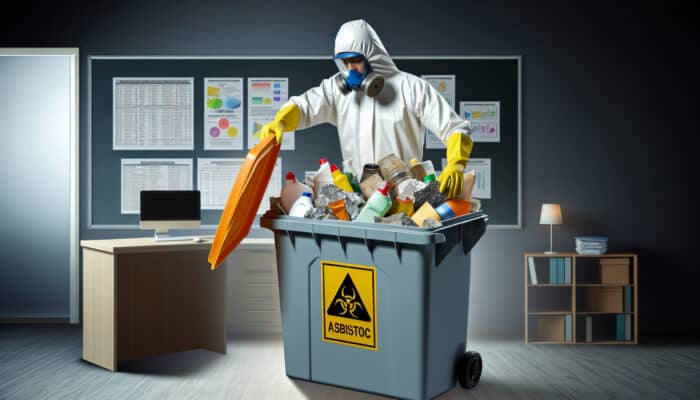
Hiring experts in hazardous waste management can significantly streamline the house clearance process. Professionals bring invaluable expertise and experience, enabling homeowners to navigate the complex challenges of identifying and disposing of hazardous waste. For example, specialists can identify materials that may not be readily recognized as hazardous, such as certain household cleaners or construction materials containing asbestos.
Experts also ensure that the appropriate disposal methods are used. They have access to licensed waste carriers and are well-versed in the regulatory requirements for the safe transportation and disposal of hazardous waste. By enlisting these professionals, homeowners can avoid the dangers associated with improper disposal, thereby protecting both their health and the environment. Real-world examples illustrate how professional involvement has facilitated successful clearances, allowing homeowners to effectively manage hazardous materials and comply with local regulations.
Additionally, experts can provide education on best practices for hazardous waste management, empowering homeowners with the knowledge needed to make informed decisions about future waste disposal. This not only enhances safety during house clearance but also fosters a more environmentally responsible approach to waste management.
What Are the Recommended Best Practices for Safe Disposal of Hazardous Waste?
Implementing best practices for hazardous waste disposal is crucial for ensuring safety and compliance with regulations. Fundamental practices include segregating hazardous waste from general waste, utilizing licensed waste carriers for transportation, and maintaining comprehensive records of all disposal activities. Segregation is particularly critical; by keeping hazardous materials separate, homeowners can prevent accidental exposure and ensure they are managed appropriately.
Engaging licensed waste carriers is another vital aspect of best practices. Licensed professionals are trained in the safe handling and disposal of hazardous materials, ensuring compliance with UK regulations. Homeowners should verify the credentials of any service they consider to avoid potential legal complications.
Maintaining disposal records is equally important. Documentation serves as proof of compliance with regulatory requirements and can protect homeowners in the event of legal inquiries regarding their waste management practices. This practice not only demonstrates responsibility but also fosters accountability in hazardous waste disposal.
What Qualities Should You Look for in a Hazardous Waste Removal Service?
When selecting a hazardous waste removal service, homeowners should prioritize licensing, experience, and a proven track record. Licensing is essential; it ensures that the service operates within the legal framework governing hazardous waste management in the UK. Homeowners can verify a company’s licensing status through the Environment Agency‘s public register.
Experience is another critical factor. A well-established service will have a verified history of managing various types of hazardous waste and navigating the complexities of local regulations. It is advisable to seek testimonials or case studies to evaluate a company’s effectiveness and reliability.
Additionally, homeowners should inquire about the disposal methods employed by the service. Understanding how the company manages waste can provide reassurance regarding safety and environmental compliance. Finally, obtaining a comprehensive quotation and ensuring the service maintains thorough documentation of all waste disposal activities will further protect against potential liabilities.
How Do Regulations Impact House Clearance Costs?
Hazardous waste regulations can significantly influence the costs associated with house clearance. The need for specialized services, compliance with strict disposal methods, and the risk of fines due to non-compliance all contribute to increased expenses. Engaging licensed professionals often incurs higher fees than standard waste removal services; however, this cost reflects the enhanced safety and legal compliance that accompany expert assistance.
Moreover, the complexity of the waste itself can elevate costs. For instance, if a property contains a substantial volume of hazardous materials, the clearance process may take longer and require more resources, further increasing expenses. Nevertheless, effective planning and expert consultation can aid homeowners in managing these costs. Professionals can provide insights into cost-effective solutions, such as identifying recyclable materials that may lower disposal fees.
Ultimately, while the initial costs related to adhering to hazardous waste regulations may seem daunting, they serve to protect homeowners from potentially much larger financial liabilities associated with improper disposal practices.
What Common Mistakes Should Be Avoided in Hazardous Waste Management?
Common errors in hazardous waste management can lead to severe consequences, including legal complications and environmental harm. One prevalent mistake is the improper segregation and disposal of hazardous materials. Homeowners often inadvertently mix hazardous waste with general waste, creating significant risks to health and the environment.
Another frequent oversight is non-compliance with regulations. Many homeowners underestimate the importance of adhering to legal requirements and fail to engage licensed disposal services or maintain necessary documentation. Such lapses can result in substantial fines and legal challenges.
Furthermore, many individuals neglect to recognize the signs of hazardous waste contamination, such as unusual odors or discoloration of materials. Ignoring these indicators can exacerbate health risks. Seeking expert guidance on proper hazardous waste management can help mitigate these mistakes, ensuring safety and regulatory compliance during house clearance.
How Can You Identify Hazardous Waste in Your Home?
What Common Household Items Are Considered Hazardous Materials?
Common household hazardous materials are substances that can pose risks to health and the environment if not managed correctly. These often include items commonly found in garages, basements, and other storage areas, where individuals might overlook the presence of hazardous waste.
Examples of such materials include:
- Paints and paint thinners
- Garden chemicals, such as pesticides and herbicides
- Household cleaners
- Old electronics and batteries
- Used motor oil
- Products containing asbestos
- Fluorescent light bulbs
- Solvents and adhesives
Being vigilant about these items is crucial, as they can accumulate over time. Correct identification is the first step toward ensuring their safe and legal disposal.
What Are the Best Practices for Safely Handling Hazardous Waste?
Safe handling of hazardous waste is essential for protecting both human health and the environment. Key practices include wearing suitable protective gear, such as gloves, masks, and goggles, to minimize exposure to harmful substances. It is equally important to avoid mixing different types of hazardous waste, as this can lead to unforeseen chemical reactions or increased toxicity.
Furthermore, always follow specific disposal instructions provided on product labels or by local waste management authorities. For example, many hazardous materials require specific storage conditions before disposal, such as keeping them in a cool, dry place away from direct sunlight. Additionally, it is advisable to retain hazardous materials in their original containers, as these are labeled with essential information regarding the contents.
If you suspect hazardous waste is present in your home, safe handling practices become even more critical. In such cases, seek professional assistance to mitigate risks and ensure compliant disposal.
What Signs Indicate the Presence of Hazardous Waste Contamination?
Identifying the signs of hazardous waste contamination is vital for maintaining safety within your home. Common indicators include unusual odors, which may suggest the presence of toxic substances. Additionally, discoloration of materials, such as rust on metals or fading paint, can indicate chemical reactions that may be harmful.
Damage to materials serves as another warning sign; for instance, if containers are leaking or corroded, it is crucial to proceed with caution. If contamination is suspected, contacting a professional service for assessment and remediation becomes essential, as they possess the necessary expertise and equipment to manage potentially hazardous situations safely.
Being aware of these signs and taking prompt action not only helps protect your family but also contributes to a safer overall environment. Timely intervention can prevent further complications and ensure that hazardous waste is managed effectively.
Effective Approaches for Navigating Hazardous Waste Regulations During House Clearance
What Effective Strategies Can Be Implemented for Waste Segregation?
Effective waste segregation strategies are essential for managing hazardous waste efficiently and safely. One highly effective method is utilizing separate containers for different types of waste. This practice minimizes the risk of cross-contamination and ensures that each waste type is handled according to its specific disposal requirements.
Clearly labeling each container is another crucial step. This not only aids everyone in the household in understanding where materials should be placed, but it also helps waste handlers quickly identify materials during collection. Implementing educational initiatives within the household can further enhance responsible waste segregation, fostering a culture of safety and compliance.
By adopting these practices, homeowners not only remain compliant with regulations but also significantly reduce the risk of accidents, ensuring a safer environment for their families and the broader community. Proper segregation ultimately streamlines the disposal process, making it more efficient and cost-effective.
How Can You Ensure Compliance with UK Regulations for Hazardous Waste?
Ensuring compliance with UK hazardous waste regulations necessitates a proactive approach. Homeowners should stay informed about the latest legal requirements and updates regarding hazardous waste management. Engaging with local authorities and the Environment Agency can provide valuable insights into current regulations affecting hazardous waste disposal.
Collaborating with licensed professionals is another essential step. These experts understand compliance standards and can assist homeowners in navigating the complexities of hazardous waste management. It is also important to maintain thorough records of all waste disposal activities, including the types of waste disposed of, the methods used, and the service providers involved.
Regular audits of waste management practices can help identify areas for improvement and ensure ongoing compliance. By adopting these strategies, homeowners can demonstrate their commitment to responsible hazardous waste management while protecting public health and the environment.
What Are the Risks of Non-Compliance with Hazardous Waste Regulations?
The consequences of non-compliance with hazardous waste regulations can be severe. Homeowners may face substantial fines and legal action, particularly if hazardous materials are disposed of improperly, leading to environmental contamination. Such actions not only harm the ecosystem but also pose risks to public health, potentially resulting in serious legal repercussions for those responsible.
Moreover, non-compliance can damage reputations and undermine trust within the community. Homeowners who neglect proper waste management practices may encounter difficulties in selling their properties or obtaining insurance. The long-term implications can extend beyond immediate legal and financial penalties, affecting residents’ quality of life and the integrity of the surrounding environment.
Recognizing the importance of compliance is vital for safeguarding both individual and community well-being. Adopting responsible hazardous waste management practices not only ensures legal adherence but also cultivates a healthier environment for everyone.
Available Options for Disposal and Recycling of Hazardous Waste
Where Can Hazardous Waste Be Disposed of in the UK?
Disposing of hazardous waste in the UK involves several options, each with specific guidelines and acceptance criteria. Local waste disposal sites typically accept hazardous materials, provided they are pre-approved and separated from general waste. Homeowners should consult their local council for specific disposal sites that manage hazardous waste.
Additionally, hazardous waste collection events organized by local authorities or environmental agencies offer a secure means for residents to dispose of such materials. These events usually provide free disposal services for common hazardous items, making them an accessible option for homeowners.
Specialized disposal services are also available for those with larger quantities of hazardous waste or specific types of materials, such as asbestos or electronic waste. Engaging licensed professionals ensures that waste is disposed of in compliance with regulations, reducing the risk of environmental harm.
Regardless of the chosen disposal method, homeowners must adhere to all guidelines and keep records of disposal activities to demonstrate compliance with regulations.
What Recycling Opportunities Exist for Hazardous Materials?
Recycling options for hazardous materials are crucial for minimizing environmental impact while promoting sustainable practices. Facilities that process certain hazardous materials, such as batteries, electronics, and various chemicals, are licensed to handle these materials safely. Homeowners should seek out these specialized recycling facilities to ensure that hazardous waste is managed responsibly.
For instance, battery recycling programs allow residents to return used batteries to designated collection points, where they are processed to recover valuable materials while preventing harmful substances from entering the environment. Electronic waste recycling services are also widely available, ensuring that materials such as metals and plastics are reclaimed and reused.
Homeowners should also look for community recycling events focused on hazardous materials, which often offer opportunities for responsible disposal while educating the public about hazardous waste management. By utilizing these recycling options, homeowners not only comply with regulations but also contribute to a more sustainable future.
What Strategies Can Help Minimize Hazardous Waste in Your Home?
Reducing hazardous waste within your home is an effective strategy for minimizing environmental impact and ensuring safety. One of the simplest approaches is to choose eco-friendly products whenever possible. By opting for non-toxic cleaners, biodegradable pesticides, and sustainable materials, homeowners can significantly reduce the amount of hazardous waste generated.
Proper storage and disposal of chemicals are also essential. Ensuring that hazardous materials are securely stored, out of reach of children and pets, can prevent accidental exposure. When disposing of such materials, always adhere to local guidelines and engage with licensed disposal services to ensure responsible management.
Additionally, recycling whenever feasible can further lessen hazardous waste. Many local councils offer recycling schemes for batteries and electronic devices, promoting responsible disposal practices. By implementing these strategies, homeowners can significantly minimize hazardous waste in their households while fostering a safer and more sustainable living environment.
What Are the Legal Responsibilities for Hazardous Waste Disposal?
Legal obligations for hazardous waste disposal in the UK are stringent and designed to ensure safe and compliant waste management. Homeowners must secure permits for disposing of certain types of hazardous waste, as specified by the Environment Agency. Each type of hazardous waste must be accurately classified and managed according to the regulations governing its disposal.
Moreover, homeowners are required to maintain thorough records of all hazardous waste disposal activities, including the nature of the waste, the methods employed, and the services engaged. This documentation is essential for demonstrating compliance and can protect homeowners from potential legal inquiries.
Failure to adhere to these legal requirements can result in significant penalties, including fines and legal action. Partnering with licensed professionals who understand the regulatory landscape facilitates compliance with all relevant laws, minimizing risks and protecting the environment.
How Can Businesses Effectively Manage Hazardous Waste?
Businesses play a critical role in the effective management of hazardous waste, as improper practices can lead to severe legal and environmental consequences. Implementing waste reduction strategies is essential; this involves evaluating operations to identify potential sources of hazardous waste and developing plans to minimize their generation.
Utilizing licensed waste carriers is another vital practice. These professionals are trained in the safe handling and disposal of hazardous materials, ensuring compliance with UK regulations. Businesses should conduct regular training sessions for employees, educating them about the significance of hazardous waste management and the specific procedures they must follow.
Maintaining detailed records of all hazardous waste disposal activities is critical for compliance. Documentation should include waste types, disposal methods, and the service providers involved. Regular audits can help identify areas for improvement, ensuring that businesses adhere to legal requirements while promoting sustainable practices.
Integrating these strategies into business operations not only aids in the effective management of hazardous waste but also enhances the organization’s reputation as a responsible entity committed to environmental stewardship.
Case Studies Highlighting Effective Hazardous Waste Management Practices
What Lessons Can Be Learned from Successful Hazardous Waste Clearance Initiatives?
Successful hazardous waste clearance cases highlight the importance of meticulous planning, professional assistance, and strict adherence to regulations. For instance, a case study involving a residential property undergoing renovations revealed significant amounts of hazardous materials, including asbestos and outdated paints. By hiring a licensed hazardous waste management service, homeowners were able to safely identify, segregate, and dispose of these materials while ensuring compliance with all local regulations.
Another example featured a community initiative where residents collaborated with local authorities to organize a hazardous waste collection event. This not only facilitated the safe disposal of numerous hazardous items but also educated the community about best practices in waste management. Such successful clearances underscore the effectiveness of engaging professionals and the positive impact of community participation in hazardous waste management.
These examples illustrate that proper planning, informed decision-making, and adherence to regulations are vital for successful hazardous waste clearance. The lessons learned can guide future practices, ensuring safer and more effective management of hazardous materials.
How Have UK Regulations Shaped House Clearance Practices?
UK regulations have substantially influenced house clearance practices, resulting in stricter controls and refined procedures for handling hazardous waste. The implementation of the Hazardous Waste Regulations 2005 has increased awareness among homeowners and service providers regarding the necessity of compliant waste management. This shift has fostered a culture of accountability, ensuring that hazardous materials are treated with the respect and caution they require.
Consequently, many clearance services have adapted their practices to align with these regulations, enhancing their training and operational protocols to maintain compliance. For example, the requirement for precise waste classification means that clearance teams are now better equipped to identify hazardous materials, employing trained professionals who understand the legal implications of mishandling such waste.
Furthermore, the heightened emphasis on environmental sustainability has encouraged more effective recycling programs and disposal methods, benefiting both the community and the environment. Overall, UK regulations have transformed house clearance practices, promoting safer and more responsible approaches to hazardous waste management.
What Are the Common Challenges Encountered in Hazardous Waste Management?
Common challenges in hazardous waste management include identifying all hazardous materials, locating appropriate disposal methods, and ensuring compliance with evolving regulations. Homeowners may struggle to recognize certain items as hazardous, particularly those that are less obvious, such as older cleaning products or materials containing asbestos.
Another significant challenge is finding suitable disposal options that comply with regulatory standards. Many homeowners mistakenly assume that all waste can be discarded in local rubbish bins, which can lead to legal complications. Understanding the intricacies of hazardous waste disposal requires ongoing education and awareness of local regulations.
Moreover, the constantly changing landscape of environmental regulations can pose difficulties for both homeowners and businesses. Staying informed and adapting practices to meet new requirements is crucial for effective hazardous waste management. Engaging with experts who are knowledgeable about current regulations can help alleviate these challenges, ensuring the safe and compliant disposal of hazardous materials.
How Is Technology Enhancing the Management of Hazardous Waste?
Technology provides innovative solutions to improve hazardous waste management, making it more efficient and safer. For instance, specialized software can assist in tracking hazardous materials, ensuring accurate record-keeping and compliance with regulations. These systems enable homeowners and businesses to monitor their waste management practices in real time, highlighting areas for improvement.
Furthermore, advancements in waste processing technology have enhanced disposal methods. For example, new incineration technologies can reduce emissions and increase the efficiency of hazardous waste treatment, minimizing environmental impact. Additionally, smart recycling facilities are emerging, which utilize automated systems to sort and process hazardous materials safely.
Real-time monitoring systems can also provide insights into waste generation patterns, facilitating more informed decision-making regarding waste reduction strategies. By leveraging technology, homeowners and businesses can improve their hazardous waste management practices, ensuring compliance while contributing to a more sustainable future.
Frequently Asked Questions About Hazardous Waste Management
What Types of Waste Are Classified as Hazardous?
Hazardous waste includes materials such as paints, solvents, batteries, pesticides, and certain electronic products that pose risks to human health and the environment.
How Can I Identify Hazardous Waste in My Home?
Look for common hazardous materials in areas like the garage or shed, including chemicals, old batteries, and electronic waste. Proper inspection and awareness are key.
Is It Permissible to Dispose of Hazardous Waste in Regular Bins?
No, hazardous waste must not be discarded in regular bins. It requires specific disposal methods that comply with UK regulations to prevent environmental damage.
What Should I Do If I Discover Hazardous Waste in My Home?
If you find hazardous waste, avoid directly handling it. Contact a licensed hazardous waste removal service for safe identification and disposal.
Are There Costs Associated with Hazardous Waste Disposal?
Yes, there can be costs related to hazardous waste disposal, especially if you utilize licensed services or require specialized disposal methods.
How Can I Locate a Licensed Hazardous Waste Disposal Service?
You can find licensed disposal services by consulting the Environment Agency‘s public register or by requesting recommendations from local authorities.
What Are the Consequences of Improperly Disposing of Hazardous Waste?
Improper disposal can lead to severe fines, legal action, and environmental harm, adversely affecting both health and safety in the surrounding community.
What Strategies Can I Implement to Reduce Hazardous Waste in My Household?
You can minimize hazardous waste by opting for eco-friendly products, securely storing chemicals, and recycling materials whenever feasible.
What Role Does the Environment Agency Play in Hazardous Waste Management?
The Environment Agency regulates hazardous waste management in the UK, ensuring compliance with legal requirements and promoting safe disposal practices.
Can Businesses Generate Hazardous Waste?
Yes, businesses can generate hazardous waste, and they must comply with specific regulations regarding its management and disposal to ensure safety and legal adherence.
Connect with us on Facebook!
The Article: Hazardous Waste Regulations for House Clearance: UK Guide Was First Found At https://birminghamhouseclearance.com
The Article Hazardous Waste Regulations: UK House Clearance Guide Was Found On https://limitsofstrategy.com

